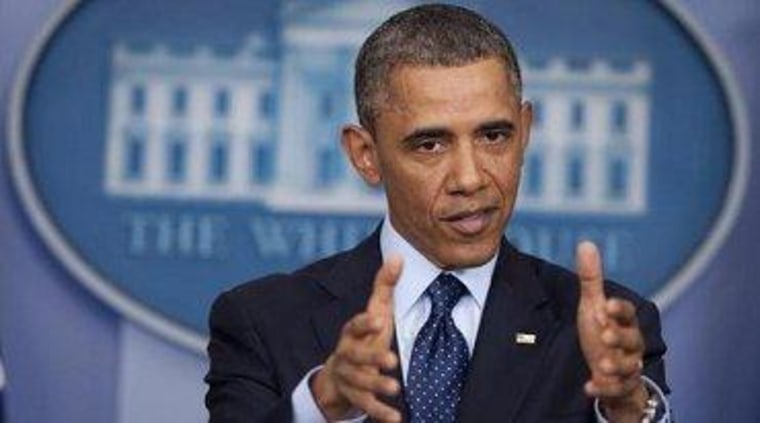After President Obama treated 12 Republican senators to dinner, and had a nice lunch with House Budget Committee Chairman Paul Ryan (R-Wis.), the Beltway's reaction can be summarized in one word: Finally.
Sen. Tom Coburn (R-Okla.), who attended Wednesday's dinner, said, "This is the first step that the president has made to really reach out and do like other presidents in the past -- develop relationships and build trust." House Speaker John Boehner (R-Ohio) added, "After being in office four years, he's actually going to sit down and talk to members."
And while plenty of pundits are echoing the sentiments, John Dickerson notes that those who insist this is a first for Obama are mistaken.
The aloof president is reaching out. That was the media's first gloss on the president's new robust effort at networking. He had finally embraced a Truth of Washington: You must engage your opponents and work with them. Finally he's showing leadership. Hooray! [...]But this isn't the first time the president has tried.... Early in his first term, during negotiations over the stimulus package, he reached out to Sens. Grassley, Snowe, Collins, and Specter.... Obama may not be very good at trying to work Congress; he may only have done it in fits and starts, but you can't say he hasn't tried.
On the Recovery Act, Obama reached out to Republican lawmakers. On health care, the president not only reached out, he spent about as much time talking to Olympia Snowe and Susan Collins as he did talking to his own staff. In May 2011, Obama invited a bipartisan group to the White House, not for a meeting or policy negotiations, but as part of "a get-to-know-you effort in the spirit of bipartisanship and collegiality." In one of my very favorite moments of Obama's presidency to date, he even attended a House Republican retreat, engaging in a spirited Q&A.
But, my DC pundit friends will tell me, these outreach efforts don't count because they were in professional settings. What Obama needs to do is try personal outreach in informal ways and friendly settings. Except, the president has tried this, too, inviting members to the White House for Super Bowl and March Madness parties, and even golfing with Boehner.
Those who keep asking why Obama hasn't reached out before this week don't seem to be paying close enough attention.
So, why haven't the efforts paid dividends? Dickerson has some worthwhile ideas on the subject, but for what it's worth, I'll add some speculation of my own.
For one thing, the parties sharply disagree with one another -- there is no modern precedent for partisan polarization as intense as today's status quo -- and presidential outreach won't change that. Congressional Republicans tend to fundamentally reject just about everything the White House wants, believes, and perceives as true. Presidential face-time changes nothing.
For another, outreach may help set the stage for constructive negotiations, but compromise has been rendered all but impossible, not just because Republicans reflexively oppose everything Obama supports -- including, at times, their own ideas -- but also because the parties can't horse-trade when one side doesn't have much of a wish list.
Jonathan Bernstein had a very smart post on this yesterday.
In a world of divided government with two sensible parties, the logical compromise is that Republicans would trade the minimum wage hike -- a popular policy Democrats care more about than Republicans anyway -- for something which Republicans care about more than Democrats. That's what happened last time, when Republicans were able to extract tax cuts for business in exchange for supporting the increase, with the whole thing going into a larger bill that had plenty of things for both parties.And this gets at a larger problem that explains a lot about dysfunction in Washington right now: Republicans have largely given up on developing specific policy goals while becoming more and more dedicated to opposing compromise on everything as some sort of fundamental principle.Think about it: what is the Republican agenda item the party could trade for a minimum wage increase? What's the GOP policy request on health care, other than the dream of repealing the Affordable Care Act? What's their policy request on climate? Energy? Education? I mostly have no idea.
And neither do I. Sure, it's obvious Republicans have some vague policy preferences -- energy = drilling; education = vouchers -- and certainly stick to broad principles on tax cuts, but the traditional give-and-take process falls apart when transactional policymaking isn't a possibility.
Obama could host luncheons and dinners every day, but this larger dynamic won't budge.
